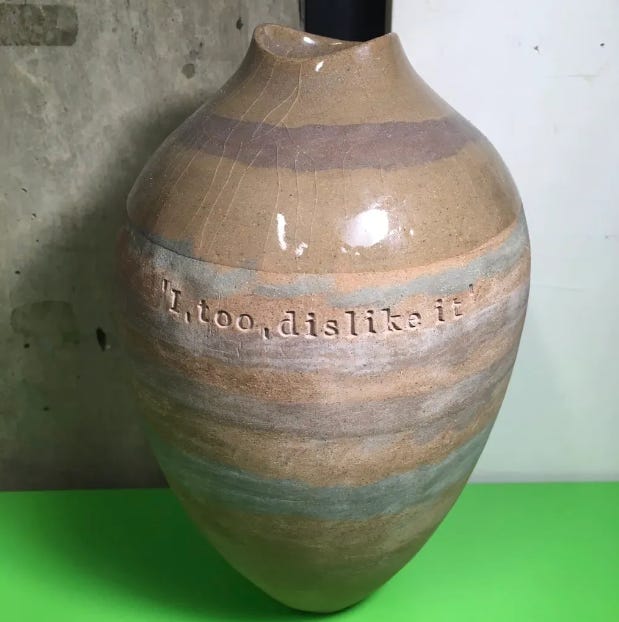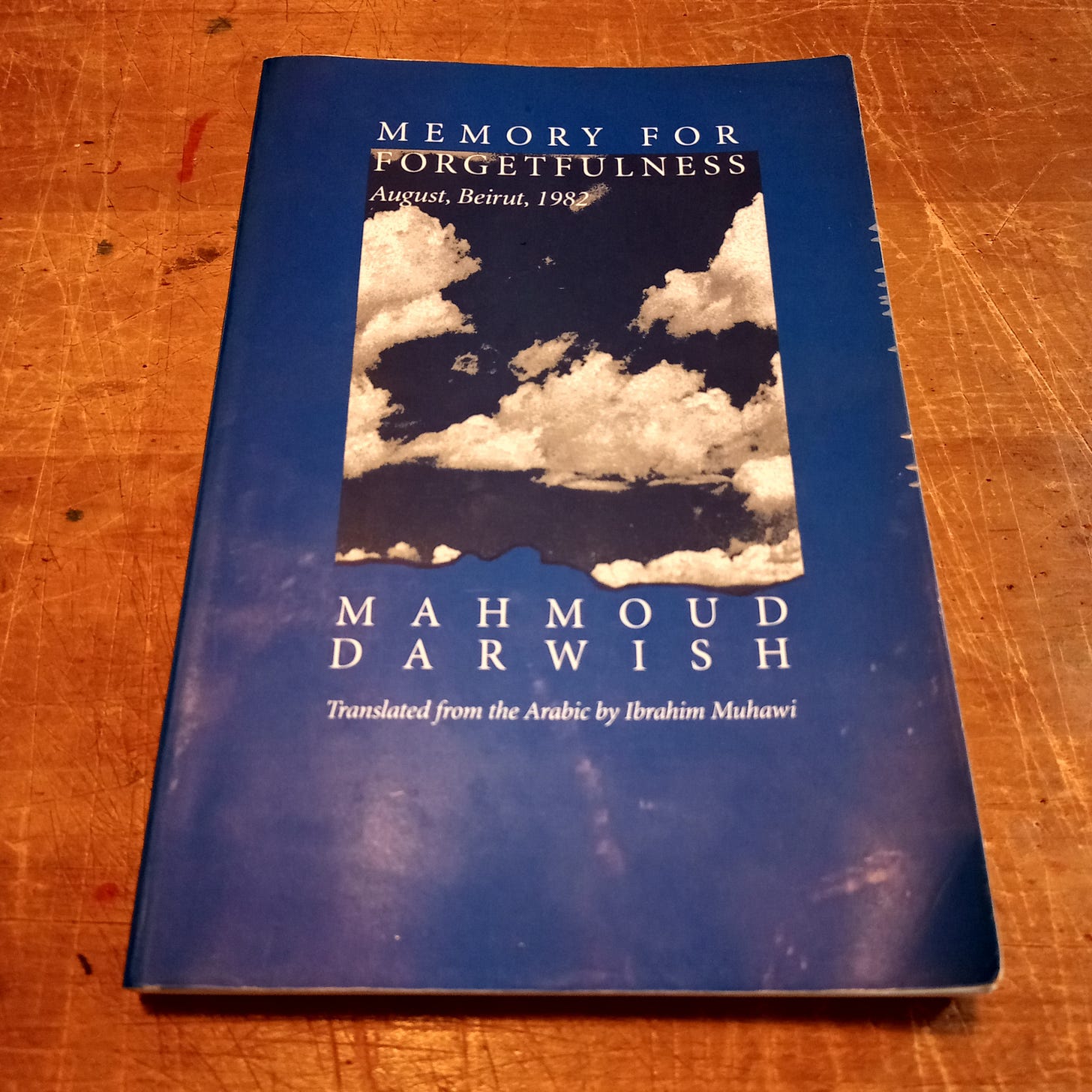At the end of the summer I was at a family party, when somebody said: “So, what’s this new pottery thing you’re doing?”
Guessing which wires had got crossed, I explained that I had begun working one day a week on a poetry newsletter. “No, I’m sure it was pottery, I saw it on Facebook.” Other distant relatives chimed in: “Yeah, I saw it too, I thought you were doing pottery.”
Here’s the post I wrote earlier this summer to say I was starting paid subscriptions. It’s also the post my wife shared with family and friends on Facebook:
Interested in Poetry
I didn’t post anything last week because I was, happily, too busy enjoying my day job: first, as the co-organiser of a one-day conference on poetry archives at the University of East Anglia, and then (same day, same place, same role) the public launch …
As you can see, the post is about poetry but it’s illustrated by pottery: specifically, a pot that my University of East Anglia colleague, the novelist Andrew Cowan, made me a couple of years ago, with the first words of Marianne Moore’s poem “Poetry” pressed into its clay (“I, too, dislike it”).
Just to add to the confusion for my extended family, I’ve illustrated this post with a different pot, which Andrew made after seeing the picture above and noticing that the first pot was “scumming”: something that happens, he explained, when “salts in the clay have precipitated to the surface creating a chalky white discolouration” — adding, Mooreishly, “I dislike it”.
Despite my protests that I was very happy with my old pot, Andrew was not. He has now retired from UEA — to make pots every day, and write a book about pottery — so we arranged to meet for a hand-over. As you can see, the new pot is a thing of beauty, with a deep green ring of copper carbonate around its glazed neck and the rest of Moore’s line (“there are things that are important beyond all this fiddle”) carved around its orbicular body.
I told Andrew the story of my pottery newsletter. And he told me how, when he retired, he emailed old friends to let them know his future plans — and accidentally typed that he was writing a book about poetry.
So, our funny stories mirrored each other, although not quite symmetrically. This post aside, I’m never going to write knowledgeably about scumming, copper carbonate, etc. But I’ve never quite believed Andrew’s professional disavowal — as a novelist — of any great insight into poetry. Take, for example, this extraordinary description of how he writes, from his book The Art of Writing Fiction (second edition, 2023):
Ever since school […] my habitual method has been to begin with minimal preparation (rough notes seeming altogether too rough, too messy) and to proceed strictly from the beginning, painstakingly building one slow sentence upon another, until finally, eventually, I arrive at the last sentence and can declare my job done, no further revision required, no overhaul possible.
The assumption underlying this approach is “first thought, worst thought”, and the consequence is that I will feel compelled to rewrite each line I put down, and to continue rewriting that line until I feel certain […] Only then will I be able to move on to my next line. Except that the rhythm or sense of the next line will inevitably require me to go back and re-revise the previous line, and the one before that. And though I will, eventually, achieve a paragraph in this manner, every subsequent paragraph will require me to comb back through the previous paragraphs, just as every additional page will require me to refine every previous page. More agonising still, just as this method requires me to make judgements based on the rhythm and sense of everything that has preceded the current sentence, it also requires me to anticipate the sense and rhythm of everything that is still to come.
This, surely, is a poet in prose clothing, madly dedicated to “all this fiddle”. To hear the results, I recommend the exactingly rhythmical realism of Andrew’s most recent novel, Your Fault (Salt, 2019). Here is a pet budgie conjured up by that fluttering poetic foot, the dactyl (DUM-di-di): “Angrily, too, she will scatter the seeds in her tray, or peck at her cuttlefish, or rattle her bell”. I look forward to his roman à clay.
Years ago, a friend who is always reading the best things gave me a copy of Memory for Forgetfulness, a memoir of the 1982 siege of Beirut, by the Palestinian poet Mahmoud Darwish. Phrases from its opening pages have stayed with me: the sound of shelling at dawn as “metal preparing a feast for metal the master”; the dry voices of BBC newsreaders as “sand describing sea”; and the wisdom that white cups enhance “the freedom of coffee” (I have kept a white coffee cup in the cupboard ever since).
Despairing at the news this week, I went back to the book to find these words in the full context of Darwish’s rich, intensely-thinking prose — and realised that the almost dandyish aside about coffee is the distilled essence of a profound meditation on the desire for peace:
How can I diffuse the aroma of coffee into my cells, while shells from the sea rain down on the sea-facing kitchen, spreading the stink of gunpowder and the taste of nothingness? I measure the period between two shells. One second. One second: shorter than the time between breathing in and breathing out, between two heartbeats. One second is not long enough for me to stand before the stove by the glass facade that overlooks the sea. One second is not long enough to open the water bottle or pour the water into the coffee pot. One second is not long enough to light a match. But one second is long enough for me to burn.
[…]
I want the aroma of coffee. I need five minutes. I want a five-minute truce for the sake of coffee. I have no personal wish other than to make a cup of coffee. With this madness I define my task and my aim. All my senses are on their mark, ready at the call to propel my thirst in the direction of the one and only goal: coffee.
[…]
Gently place one spoonful of the ground coffee, electrified with the aroma of cardamom, on the rippling surface of the hot water, then stir slowly, first clockwise, then up and down. Add the second spoonful and stir up and down, then counterclockwise. Now add the third. Between spoonfuls, take the pot away from the fire and bring it back. For the final touch, dip the spoon in the melting powder, fill and raise it a little over the pot, then let it drop back. Repeat this several times until the water boils again and a small mass of the blond coffee remains on the surface, rippling and ready to sink. Don’t let it sink. Turn off the heat, and pay no heed to the rockets. Take the coffee to the narrow corridor and pour it lovingly and with a sure hand into a little white cup: dark-colored cups spoil the freedom of the coffee.
“No coffee is like another,” Darwish reflects, “and my defense of coffee is a plea for difference itself.” You can read the whole book, translated by Ibrahim Muhawi, here:
https://publishing.cdlib.org/ucpressebooks/view?docId=ft1z09n7g7;brand=ucpress








Great post. Andrew Cowan taught me about his novel 'Pig' in 2007.